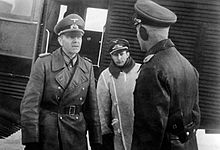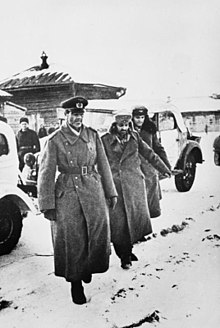Friedrich Paulus: Difference between revisions
No edit summary |
|||
| Line 54: | Line 54: | ||
After a heavy Russian offensive cut off the last emergency airstrip, the Russians again offered Paulus a chance to surrender. Once again, Hitler ordered Paulus to hold Stalingrad to the death. By [[30 January]], Paulus informed Hitler that his men were hours from collapse. Hitler responded by showering [[field promotion|a raft of promotions by radio]] on Paulus' officers to build up their spirits and steel their will to hold their ground. Most significantly, he promoted Paulus to field marshal. Since no Prussian or German field marshal in history had ever surrendered, the implication was clear--Paulus was to commit suicide. If Paulus surrendered, he would shame Germany's military history. |
After a heavy Russian offensive cut off the last emergency airstrip, the Russians again offered Paulus a chance to surrender. Once again, Hitler ordered Paulus to hold Stalingrad to the death. By [[30 January]], Paulus informed Hitler that his men were hours from collapse. Hitler responded by showering [[field promotion|a raft of promotions by radio]] on Paulus' officers to build up their spirits and steel their will to hold their ground. Most significantly, he promoted Paulus to field marshal. Since no Prussian or German field marshal in history had ever surrendered, the implication was clear--Paulus was to commit suicide. If Paulus surrendered, he would shame Germany's military history. |
||
[[Image:Bundesarchiv Bild 183-F0316-0204-005, Russland, Paulus in Kriegsgefangenschaft.jpg|thumb|Generalfeldmarschall Friedrich Paulus {right} and his aides {Generalleutnant Arthur Schmidt (m.), [[Wilhelm Adam (politician)]] left} after their surrender.]] |
[[Image:Bundesarchiv Bild 183-F0316-0204-005, Russland, Paulus in Kriegsgefangenschaft.jpg|thumb|Generalfeldmarschall Friedrich Paulus {right} and his aides {Generalleutnant Arthur Schmidt (m.), [[Wilhelm Adam (politician)]] left} after their surrender. (Image horizontally flipped, note jacket buttonings)]] |
||
Despite this, and to the disgust of Hitler, Paulus and his staff surrendered the next day, 31 January. On the 2 February 1943 the remainder of the Sixth Army capitulated. Speaking about the surrender of Paulus, Hitler told his staff: |
Despite this, and to the disgust of Hitler, Paulus and his staff surrendered the next day, 31 January. On the 2 February 1943 the remainder of the Sixth Army capitulated. Speaking about the surrender of Paulus, Hitler told his staff: |
||
Revision as of 11:25, 1 May 2009
This article includes a list of references, related reading, or external links, but its sources remain unclear because it lacks inline citations. (October 2008) |
Friedrich Wilhelm Ernst von Paulus | |
|---|---|
| File:Paulus photo.jpg Generalfeldmarschall Friedrich Paulus (shown in General's uniform) | |
| Allegiance | |
| Years of service | 1910 - 1943 |
| Rank | Generalfeldmarschall |
| Commands | Tenth Army Sixth Army |
| Battles/wars | World War I
|
| Awards | Knight's Cross of the Iron Cross with Oak Leaves |
Friedrich Wilhelm Ernst von Paulus (23 September 1890 – 1 February 1957) was an officer in the German military from 1910 to 1943, attaining the rank of Generalfeldmarschall (field marshal) during World War II. He is most known for commanding the Sixth Army's assault on Stalingrad during Operation Blue in 1942. The battle ended in disaster for Nazi Germany when approximately 270,000 soldiers of the Wehrmacht, Axis allies, and Hilfswillige were encircled and defeated in a massive Soviet counterattack in November 1942, and with casualties reaching as high as 740,000.
Paulus surrendered to Soviet forces in Stalingrad on January 31, 1943, a day after he was promoted to the rank of Generalfeldmarschall by Adolf Hitler. Hitler expected Paulus to commit suicide, citing that no German field marshal was ever captured by enemy forces. While in Soviet captivity during the war he became a vocal critic of the Nazi regime and joined the Russian-sponsored National Committee for a Free Germany. He would not be released until 1953.
Early life
Paulus was born in Breitenau, Hesse-Nassau, the son of a school teacher.
He tried, unsuccessfully, to secure a cadetship in the Kaiserliche Marine, and briefly studied law at Marburg University.
Military career
After leaving the university without a degree, he joined the 111th Infantry Regiment as an officer cadet in February 1910. He married Elena Rosetti-Solescu on 4 July 1912.
When World War I began, Paulus's regiment was part of the thrust into France, and he saw action in the Vosges and around Arras in the autumn of 1914. After a leave of absence due to illness, he joined the Alpenkorps as a staff officer, serving in Macedonia, France, and Serbia. By the end of the war, he was a captain.
After the Armistice Paulus fought with the Freikorps in the east as a brigade adjutant. He remained in the scaled-down Reichswehr that came into being after the Treaty of Versailles and was assigned to the 13th Infantry Regiment at Stuttgart as a company commander. He served in various staff positions for over a decade (1921 - 1933) and then briefly commanded a motorized battalion (1934 - 1935) before being named chief of staff for the Panzer headquarters in October 1935, a new formation under Lutz that directed the training and development of the army’s three panzer divisions.
In February 1938 Paulus was appointed Chef des Generalstabes to Guderian’s new XVI Armeekorps (Motorisiert), which replaced Lutz’s command. Guderian described him as ‘brilliantly clever, conscientious, hard working, original and talented’ but already had doubts about his decisiveness, toughness and lack of command experience. He remained in that post until May 1939, when he was promoted to Generalmajor and became Chief of Staff for the German Tenth Army, with which he saw service in Poland, the Netherlands, and Belgium (by the latter two campaigns, the army had been renumbered as the Sixth Army).
Paulus was promoted to Generalleutnant in August 1940 and the following month he was named deputy chief of the German General Staff (OQu I). In that role he helped draft the plans for the invasion of the Soviet Union.
Stalingrad

Paulus was promoted to General der Panzertruppe and became commander of the German Sixth Army in January 1942 and led the drive on Stalingrad.
Paulus followed Adolf Hitler's orders to hold the Army's position in Stalingrad under all circumstances, despite the fact that by November he was completely surrounded by strong Russian formations. A relief effort by Army Group Don under Field Marshal Erich von Manstein failed, inevitably: insufficient force was available to challenge the Soviet forces encircling the German 6th Army, and Hitler refused to allow Paulus to break out of Stalingrad despite Manstein telling him it was the only way the effort would succeed. By this time, Paulus' remaining armour had only sufficient fuel for a 12 mile advance anyway. In any event, Paulus was refused permission to break out of the encirclement. Kurt Zeitzler, the newly appointed chief of the Army General Staff, eventually got Hitler to allow Paulus to break out--provided they held onto Stalingrad, an impossible task.
For the next two months, Paulus and his men fought on. However, the lack of ammunition, equipment attrition and deteriorating physical condition of the German troops prevented them from defending effectively against the Red Army. The battle was fought with terrible losses on both sides and the most unimaginable (and perhaps unparalleled) suffering.
On 8 January 1943, General Konstantin Rokossovsky, commander of the Red Army on the Don front, offered Paulus' men generous surrender terms--normal rations, medical treatment for the ill and wounded, permission to retain their badges, decorations, uniforms, and personal effects, and repatriation to any country they wished after the war. Rokossovsky also noted that Paulus was in a nearly impossible situation. By this time, there was no hope for Paulus to be relieved or supplied by air, and his men had no winter clothing. However, when Paulus asked Hitler for permission to surrender, Hitler rejected this request almost out of hand.
After a heavy Russian offensive cut off the last emergency airstrip, the Russians again offered Paulus a chance to surrender. Once again, Hitler ordered Paulus to hold Stalingrad to the death. By 30 January, Paulus informed Hitler that his men were hours from collapse. Hitler responded by showering a raft of promotions by radio on Paulus' officers to build up their spirits and steel their will to hold their ground. Most significantly, he promoted Paulus to field marshal. Since no Prussian or German field marshal in history had ever surrendered, the implication was clear--Paulus was to commit suicide. If Paulus surrendered, he would shame Germany's military history.

Despite this, and to the disgust of Hitler, Paulus and his staff surrendered the next day, 31 January. On the 2 February 1943 the remainder of the Sixth Army capitulated. Speaking about the surrender of Paulus, Hitler told his staff:
In peacetime Germany, about 18,000 or 20,000 people a year chose to commit suicide, even without being in such a position. Here is a man who sees 50,000 or 60,000 of his soldiers die defending themselves bravely to the end. How can he surrender himself to the Bolshevists?![1]
Paulus, who as a Roman Catholic was opposed to suicide, said of Hitler's expectation: "I have no intention of shooting myself for that Austrian corporal".
Although he at first refused to collaborate with the Soviets, after the July 20th plot on Hitler's life, Paulus became a vocal critic of the Nazi regime while in Soviet captivity, joining the Russian-sponsored National Committee for a Free Germany and appealing to Germans to surrender. He later acted as a witness for the prosecution at the Nuremberg trials. He was released in 1953, two years before the repatriation of the remaining German POWs (mostly other Stalingrad veterans) who had been designated war criminals by the Soviets.
During the Nuremberg trials Paulus was asked by a reporter how the Stalingrad prisoners were doing. Knowing full well that over 90% of them were already dead, Paulus told the journalist to tell the wives and mothers that their husbands and sons were well. Of the 91,000 German prisoners taken at Stalingrad, only about 6,000 would return home.
Paulus served as an inspector of police in Dresden in the German Democratic Republic. Here he developed motor neuron disease and was paralysed when he eventually died on February 1st 1957.
Quote
"Ask Paulus if he knows he is a traitor. Ask him if he has taken out Russian citizenship papers." — Hermann Göring to his lawyer at the Nuremberg Trials
Footnotes
- ^ Overy 1997, p. 185.
References
- Beevor, Antony (1998). Stalingrad, The Fateful Siege: 1942-1943. New York: Penguin Books.
- Craig, William (1974). Enemy at the Gates. The Battle for Stalingrad. Victoria: Penguin Books.
- Overy, Richard (1997). Russia's War. United Kingdom: Pengiun. ISBN 0-14-027169-4.
{{cite book}}: Cite has empty unknown parameter:|coauthors=(help) - von Mellenthin, Friedrich (2006). Panzer Battles: A Study of the Employment of Armor in the Second World War. United States: Konecky & Konecky. ISBN 1-56852-578-8.
{{cite book}}: Cite has empty unknown parameter:|coauthors=(help)
- 1890 births
- 1957 deaths
- People from Schwalm-Eder-Kreis
- People from Hesse-Nassau
- Prussian generals
- Field Marshals of Nazi Germany
- Recipients of the Knight's Cross
- Order of Michael the Brave recipients
- World War II prisoners of war held by the Soviet Union
- German prisoners of war
- German commanders at the Battle of Stalingrad
